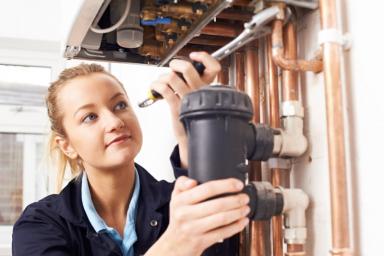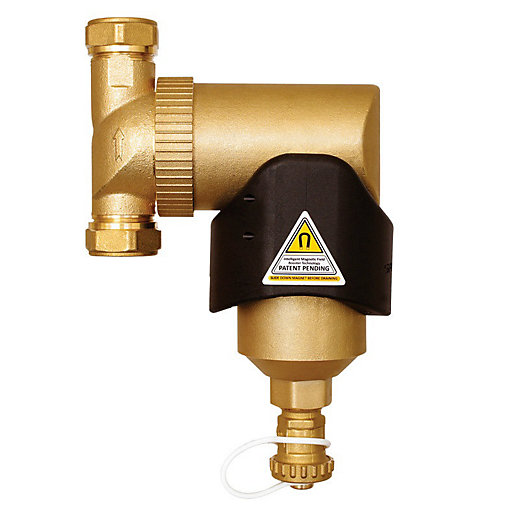Magnetic filters, corrosion, causes & prevention

What causes corrosion in heating systems?
Corrosion has been a problem since we started 'sealing' our heating systems and it is caused by air getting to the water, often when we top up the pressure on our boilers. Magnetic filters for boilers are one method of removing corroded metal from your heating system, although in some cases a power flush will still be required first. Many argue magnetic filters are treating the problem and not the cause and that a far more effective device is a deaearator.
In this guide, we help you identify if you have a dirty system and undertake a comparison of the magnetic filter models from Spirotech, Sentinel, Fernox, Magnaclean and Worcester. We also review deaerators as an alternative method to dealing with corrosion.
What are the signs and effects of corrosion?
‘Sludge’ is a common industry term for a build-up of rust in the system. Sludge builds up in open vented system. A harder form of debris forms in sealed systems, which we refer to as ‘grit’.
The effects of sludge and grit vary. Sludge tends to lead to cold spots at the bottom of radiators, as the rust settles at the bottom in little piles.
Grit tends to affect system components in the boiler and system, such as the heat exchanger (you will experience only warm water) or the pump (which will eventually seize).
Where the system is heavily affected by sludge or grit, the components, and sometimes the radiators, will need replacing and the system ‘power flushed’.
Dirty radiators cannot circulate heat effectively and will make the boiler work harder to heat the home, costing more in energy bills. A clean system will lower heating bills and reduce maintenance costs.
How does your system get dirty?
Corrosion occurs when air enters the system, usually when we top up the pressure on our boilers. Over time, the pipes and radiators will begin to corrode and a build-up of rust prevents water circulating effectively; reducing system efficiency.
Treatments for corrosion
Magnetic filters
How does a boiler magnetic filter work?
Magnetic filters are a little device close to the boiler that keep your heating system clean long term. Heating water is always sent from the boiler around the radiators and back to the boiler again. The magnetic filter is fitted on pipe that returns water back to the boiler. As water passes through the device, a large magnet attracts any rust out of the water onto the magnet so that only clean water is passed back to the boiler. The filter will need to be cleaned out once a year or so.
They are very commonly installed as part of a new boiler installation and some manufacturers will extend their boiler warranty period when they are fitted at the same time. NB for a heavily blocked system a magnetic filter alone will not be enough to clean it, you will need to power flush the system first (for more see our Guide to Power Flushing).
Magnetic filter brands
We have reviewed 10 models of magnetic filter by price, size, warranty and function. All filters do broadly the same thing, which is to pull magnetic and non-magnetic dirt out of the system. Some have developed their filtration systems more than others however.
We have identified a ‘best buy’ in each group, which we think provides a great all round product in terms of technology, price and warranty period. Speak to your fitter about your preferred choice and why. NB check the height you have available to fit the filter.
| Make | Magnaclean | Magnaclean | Sentinel | Fernox | Worcester |
|---|---|---|---|---|---|
| Model | Micro 2 | Professional 2 |
Vortex 300 BEST BUY |
Omega Filter | Greenstar Filter |
 |
 |
 |
 |
 |
|
| Price | £88.66 | £90.13 | £73.97 | £77.99 | £128.18 |
| Height | 151mm | 203mm | 205mm | 209mm | 279mm |
| Technology | Standard filter | Standard filter | Vortex (Screw) - slows down water to improve retention | Standard filter | Slows water down to improve retention of rust |
| Debris removed: | Magnetic Non magnetic |
Magnetic Non magnetic |
Magnetic Non magnetic |
Magnetic Non magnetic |
Magnetic Non magnetic |
| Warranty | 10 years | 10 years | 10 years | 25 years | 8-10 years with new Worcester boiler |
| Make | Fernox | Altecnic | Grant | Sentinal | Spirotech |
|---|---|---|---|---|---|
| Model | TF1 Compact | Dirtmag IQ | Vortex |
Eliminator BEST BUY |
Spirotrap |
 |
 |
 |
 |
 |
|
| Price | £79.74 | £79.30 | £96.56 | £84.92 | £120 |
| Height | 192mm | 238mm | 243mm | 251mm | 210mm |
| Technology | Cyclone | Water hits internal mesh and drops to bottom or attracts to magnetic if rust | Standard filter | Cyclone - 'spins down' particles to bottom of collection chamber | Cyclone - 'spins down' particles to bottom of collection chamber |
| Debris removed: | Magnetic Non magnetic |
Magnetic Non magnetic |
Magnetic Non magnetic |
Magnetic Non magnetic |
Magnetic Non magnetic |
| Warranty | 2 years | 1 years | 2 years | 10 years | 20 years |
Top Tip : work out available space for the filter
It is very common for space to be restricted when fitting a magnetic filter. Our tables below show the height of each filter. If you are restricted on space pick one of the compact models. NB you must leave room for servicing. Check the manufacturers instructions for how much room to leave to be able to clean on the filter.
Deaerators
Many argue that the industry has concentrated too hard on treating the the problem and not treating the cause. A new British Standard (BS7593) came into force in 2019 which now requires an in-line filter and chemical inhibitor with new boilers. Many in the industry argue that chemical treatments are unnecessary.
Deaerators have long been used in Germany and are slowly growing in popularity because of the many benefits they have over magnetic filters. In terms of size they are about the same as some of the smaller filters and cost the same price. The market leader for domestic deaerators is Spirotech.
Power flushing
When a system is heavily affected by sludge or grit, sometimes the only way to properly clean it is to power flush it. A power flush is a means of thoroughly cleaning the pipe and radiators in a heating system. A cleaning solution is pumped through the system and breaks down the rust build up. The rust particles are then captured by a magnetic filter attached to the machine.
Whilst flushing, all radiators are turned off and one opened at a time in order to focus that machine on that section. Each radiator is turned on one at a time until all the radiators are done. An commonly used alternative where the system is less dirty is a ‘chemical cleanse’.
Radiator flush with a chemical cleanse
A strong chemical is added to the system and left in for a period of hours or days, depending on the strength of the chemical. The chemical will break down the rust over that period. The system is then drained down, radiators flushed and refilled with clean water and inhibitor added. If the system is heavily rusted then this may not be sufficient and a power flush will be required.
VDI 2035 demineralising methods
An alternative to chemical treatments is a process know as VDI 2035 is used which naturally treats the water to prevent corrosion. They also use a device called a deaerator to remove air from the system on an on-going basis. Not all boiler manufacturers will accept VDI 2035 and it is likely that if your installer uses this method then he or she fits boilers that do accept it. NB they are usually the German boiler manufacturers who understand the benefits of this well-tested process.
Indicative costs
There are a number of very effective measures available to clean your system and keep it clean. The best measures are always preventative, i.e. using a deaerator. Other measures such as power flushing will reverse a built up of dirt in the system but will not reverse any damage it may have caused.
The table below give a breakdown of approximate costs for stand alone system cleaning measures. NB if for example you have a magnetic filter or power flush with a new boiler installation then the labour charges will likely be reduced to reflect the other works being undertaken at the same time.
| Work undertaken | Approximate costs | Time |
|---|---|---|
|
Stand alone power flush using dedicated flushing machine |
• £500-£600 incl VAT 6-10 radiators. |
• 1-1.5 days (or a long day) |
| Work undertaken | Approximate costs | Time |
|
Stand alone chemical cleanse - add strong chemical to the system, leave a few hours/days, drain down and refill with clean water and inhibitor |
• £380 incl VAT 6-10 radiators. |
• Half day |
| Work undertaken | Approximate costs | Time |
|
Magnetic filter or deaeator |
• £150 incl VAT per hour. |
• 1-2 hours |
My boiler cover provider has told me to have a power flush
If you have called out your boiler cover provider to a fault they have deemed to have been caused by rust, then they will replace the faulty parts but it will be conditional on you having a power flush. They are likely to insist this is done before they fit new parts.

1-2-1 help with your heating
More reads...
Guide to powerflushing and cleaning
A clean system is very important for comfort and efficiency. We guide you on cleaning methods.
Guide to programmers
A clean system is very important for comfort and efficiency. We guide you on cleaning methods.

